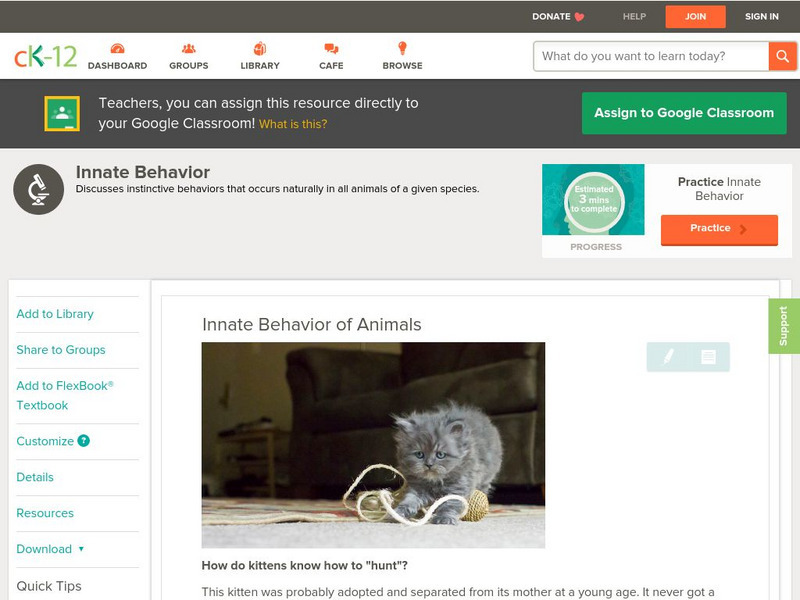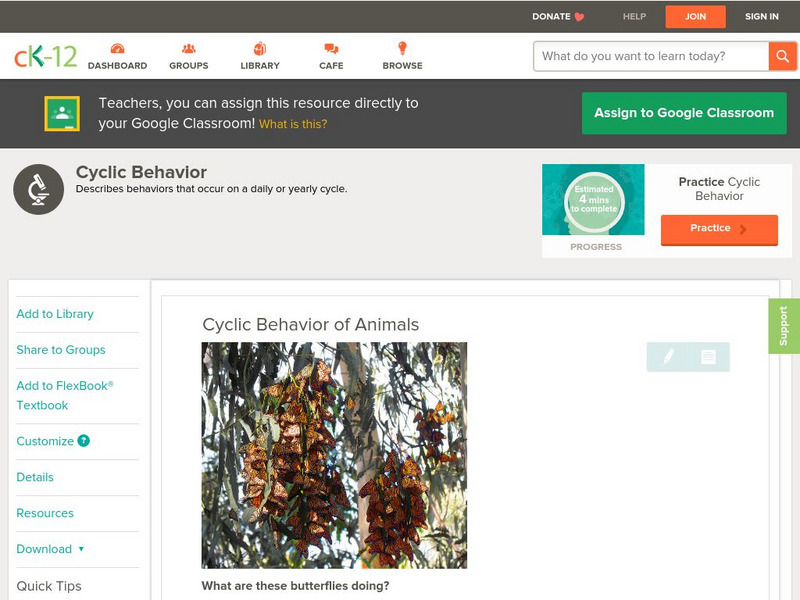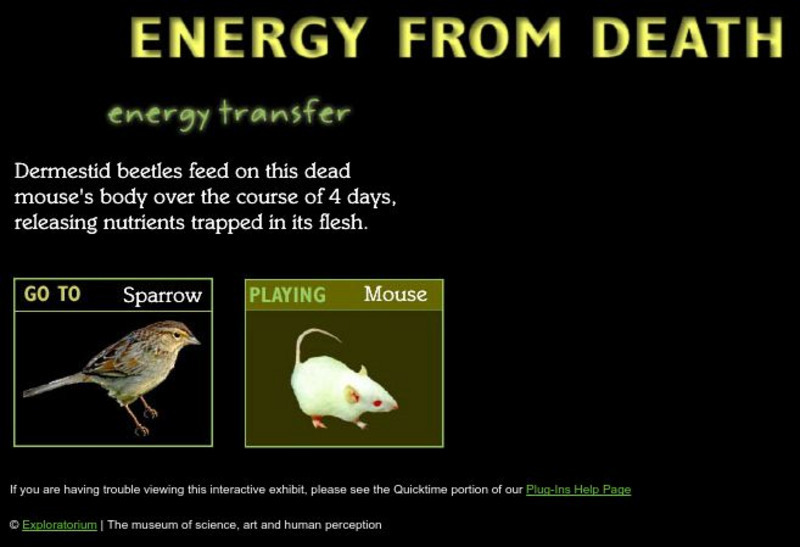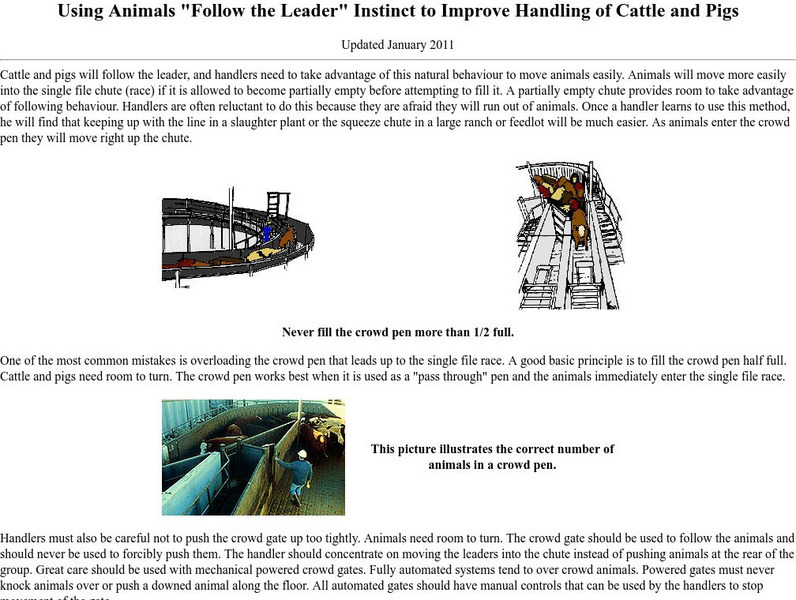CK-12 Foundation
Ck 12: Life Science: Innate Behavior of Animals
[Free Registration/Login may be required to access all resource tools.] Many animal behaviors are ways that animals act naturally. They are not learned behaviors. Cats are natural-born hunters. They don't need to learn how to hunt....
CK-12 Foundation
Ck 12: Life Science: Cyclic Behavior of Animals
[Free Registration/Login may be required to access all resource tools.] Many animal behaviors change in a regular way. They go through cycles. Some cycles of behavior repeat each year. Other cycles of behavior repeat every day. Learn...
TED Talks
Ted: Ted Ed: How Do Schools of Fish Swim in Harmony?
Nathan S. Jacobs explains the concept of emergence, the spontaneous creation of sophisticated behaviors and functions from large groups of simple elements. [6:07]
PurposeGames
Purpose Games: Inherited Traits vs. Learned Behavior
Choose the picture that shows a learned behavior or an inherited trait.
CK-12 Foundation
Ck 12: Fourth Grade Science: Life Science: Learned Behavior of Animals
[Free Registration/Login may be required to access all resource tools.] Introduces learned behaviors and the different methods of learning.
University of Arizona
University of Arizona: Eeb: Principles of Animal Behavior
Learn some basic principles of animal behavior using this collection of interactive exercises.
Alabama Learning Exchange
Alex: Nocturnal Animals Lesson #1
This lesson can be part of a two-week integrated thematic unit on nocturnal animals. During this lesson, students will be introduced to nocturnal animals. They will have an opportunity to navigate web sites to learn more about nocturnal...
Alabama Learning Exchange
Alex: Importance of Fur for Animals
This is a lesson to teach students how to read a thermometer and gain an understanding of why fur is important for some animals' survival.
CK-12 Foundation
Ck 12: Biology: Animals: Behavior Study Guide
This comprehensive study guide covers the necessary vocabulary and concepts for a unit on animal behavior.
Khan Academy
Khan Academy: Biological Explanations of Social Behavior in Animals Questions
Use these questions about the biological explanation of social behavior in animals to practice for the MCAT.
CK-12 Foundation
Ck 12: Life Science: 8.1 Animal Behavior
Explore many different types of animal behavior.
CK-12 Foundation
Ck 12: Life Science: 8.5 Cyclic Behavior
Explore different types of cycles in animal behavior.
Environmental Education for Kids
Eek!: Teacher Resources: "Deer Talk" Activity
In this activity, students will learn to recognize how deer use non-verbal communication for mutual protection and interaction within a group and the importance of this language to the survival of the group.
US Department of Agriculture
U.s. Department of Agriculture: Paint Your Pet's Behavior
Use this activity to learn more about different animal behaviors. Get creative painting or drawing!
Biology Corner
Biology Corner: Isopod Behavior Lab
This lab activity explores the environmental conditions preferred by the pill bug.
Exploratorium
Exploratorium: Energy From Death
In this animation you will see how dermestid beetles feed on a dead mouse's body for four days, releasing the nutrients trapped in its flesh. Links to a sparrow animation as well.
Scholastic
Scholastic News: Swimming With Whales
A group of whales was recently discovered to be swimming with a dolphin, who appears to be accepted as part of the group. This is a rare activity for whales.
Environmental Education for Kids
Eek!: Leave Animals in the Wild
Discover what you need to know about what makes an animal wild, including the time and energy it takes to keep a wild animal, well, wild.
Science Education Resource Center at Carleton College
Serc: How Do Worms Behave?
Students investigate how worms will interact and adapt with their environment.
PBS
Pbs Teachers:flying Casanovas: Bowerbird Basics
Examine characteristics of bowerbirds and their bowers. Compare and contrast various styles of bowers created by bowerbirds
National Audubon Society
Audubon Adventures: It's a Puffin's Life
Using this chart, see what happens at each stage of the life of a puffin in Maine.
Other
Using Animals "Follow the Leader" Instinct
Interesting site on the "Follow the Leader" instinct that can be found in animals. Livestock will follow the leader, and handlers have taken advantage of this natural behavior to move animals easily.
PBS
Pbs Teachers: Happiness Is a Warm Puppy
Investigate behaviors, characteristics and habits of various breeds of dogs, and select a breed of dog that would best fit your lifestyle. Create a picture book from a dog's point of view.

















